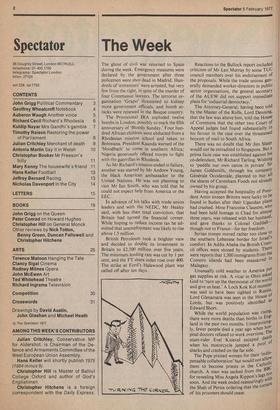The Week
The ghost of civil war returned to Spain during the week. Emergency measures were declared by the government after three policemen were shot dead in Madrid. Hundreds of 'extremists' were arrested, but very few from the right, in spite of the murder of four Communist lawyers. The terrorist organisation `Grapo' threatened to kidnap more government officials, and bomb attacks were renewed in the Basque country.
The Provisional IRA exploded twelve bombs in London, possibly to mark the fifth anniversary of 'Bloody Sunday.' Four hundred African children were abducted from a Rhodesian mission school and taken to Botswana. President Kaunda warned of the 'bloodbath' to come in southern Africa; Nigeria generously offered troops to fight with the guerrillas in Rhodesia.
As Mr Richard's mission ended in failure, another was started by Mr Andrew Young, the black American ambassador to the United Nations. He was not planning to visit Mr Ian Smith, who was told that he could not expect help from America or the EEC.
In advance of his talks with trade union leaders and with the NEDC, Mr Healey said, with less than total conviction, that Britain had turned the financial corner. While hoping to reduce income tax he admitted that unemployment was likely to rise above 1.5 million.
British Petroleum took a brighter view and decided to double its investment in Britain to £2,700 million over five years. The minimum lending rate was cut by 1 per cent, and the FT share index rose over 400. The strike at Ford's Halewood plant was called off after ten days. Reactions to the Bullock report included criticism of Mr Len Murray by some TUC council members over his endorsement of the proposals. While the trade unions generally demanded worker-directors in public sector organisations, the general secretary of the AUEW did not support immediate plans for 'industrial democracy.'
The Attorney-General, having been told by the Master of the Rolls, Lord Denning, that the law was above him, told the House of Commons that the other two Court of Appeal judges had found substantially in his favour in the case over the threatened boycott of mail to South Africa.
There was no doubt that Mr Jim Slater would not be extradited to Singapore. But .3 prima facie case was established against his co-defendant, Mr Richard Tarling. Wishing to 'paddle our own canoe in private' Sir James Goldsmith, through his companY Generale Occidentale, planned to buy all the shares of Cavenham Foods not alreadY owned by his group. Having accepted the hospitality of President Amin sixteen Britons were lucky to be found in Sudan after their Ugandan plane had crashed. Mme Francoise Claustre, wh° had been held hostage in Chad for almost three years, was released with her husbanO, and gave thanks to Colonel Gaddafithough not to France—for her freedom. Syrian troops moved rather too close to the southern Lebanese border for Israel s comfort. In Addis Ababa the British Council offices were stoned by students. There were reports that 1,300 immigrants from th,e Comoro islands had been massacred in Malagasy. Unusually cold weather in America Put, gas supplies at risk. A vicar in Ohio askeo God to 'turn up the thermostat of the 1,vorld and give us heat.' A Loch Kok Kol monster was said to have been sighted in Russia; Lord Glenamara was seen in the House 0' Lords, but was positively identified 9-5 Edward Short.
While the world population was rising, there were more deaths than births inpl land in the past two months. Unsurprising, ly, fewer people died a year ago when hose pital doctors refused to work overtime. 1411,_ stunt-rider Evel Knievel escaped cleat'', when his motorcycle jumped a pool 01 sharks and crashed on the far side.
The Pope praised women for their 'inchs pensable collaboration' but would not
them to become priests in the Cathol!c, church. A man was sacked from the BBL° for revealing Miss Angela Rippon's legs soon. And the week ended reassuringlY
the Shah of Persia ordering that the Wan' of his prisoners should cease.


































 Previous page
Previous page